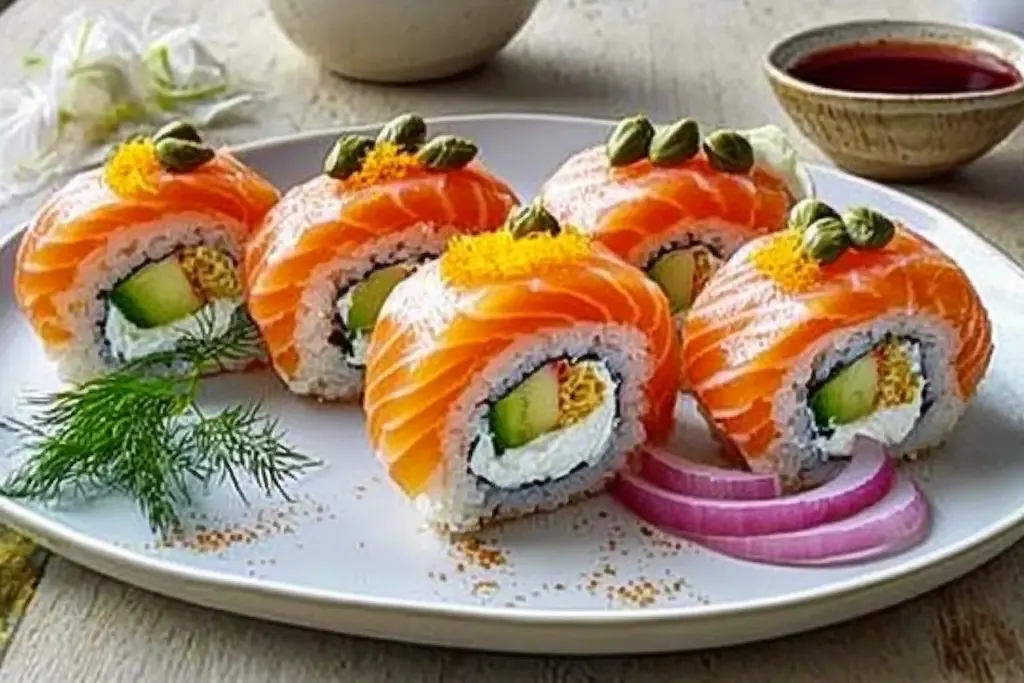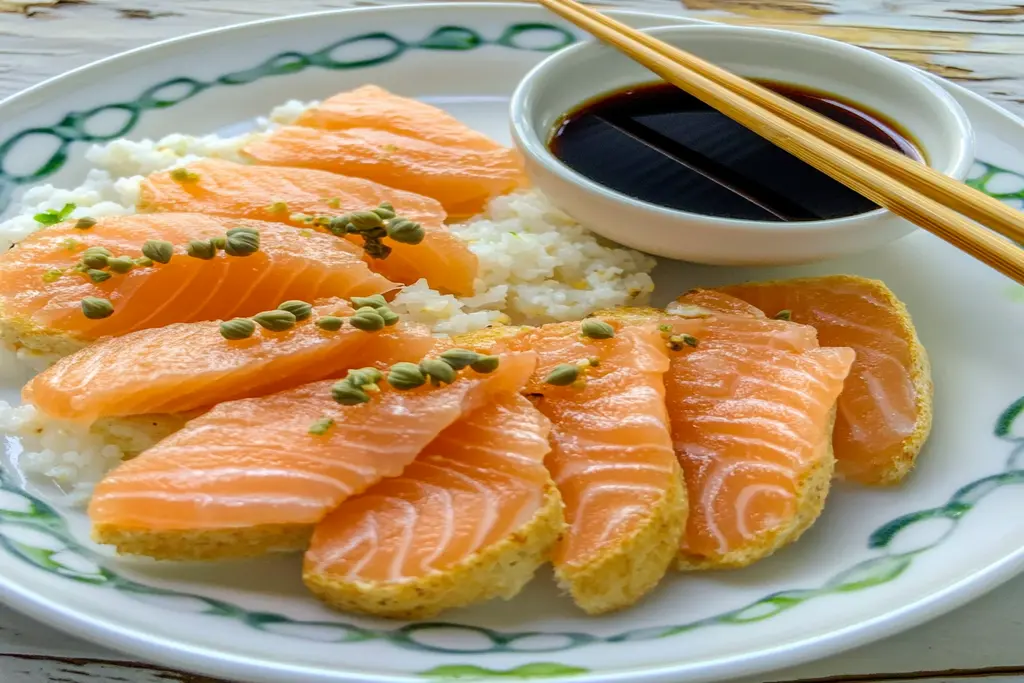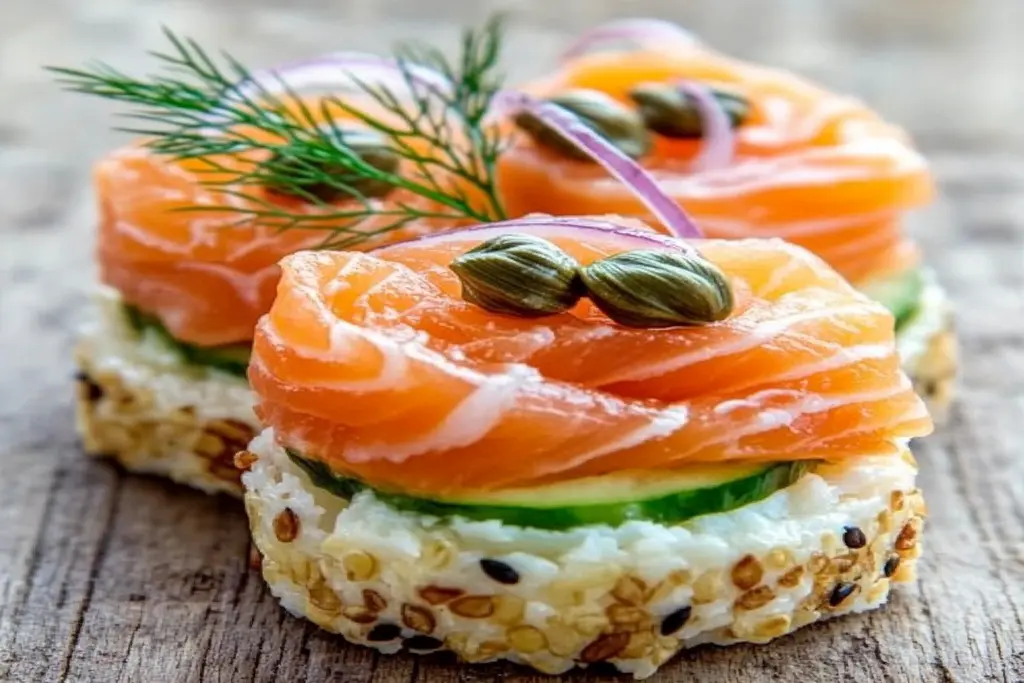Sushi is a global favorite. Its mix of fresh flavors, nutritious ingredients, and visual appeal has made it one of the most loved foods worldwide. However, for Muslims, sushi can sometimes raise questions. The most common one? Can Muslims eat salmon sushi?
This question often stems from concerns over whether sushi—and salmon in particular—meets Islamic dietary guidelines. Are the ingredients halal? Is cross-contamination an issue? And what about soy sauce or rice vinegar? These are all valid worries that require a closer look.
If you’re Muslim and love sushi, or if you’re just curious, this article is here to clear up all your doubts. By the end of this guide, you’ll know everything you need to enjoy salmon sushi confidently while adhering to your faith. So, let’s dive in! 🍣

Understanding Halal and Haram in Islam
Before we get into salmon sushi, it’s essential to understand the basics of halal and haram.
The Role of Ingredients in Determining Halal Salmon Sushi
In Islam, halal means “permissible” or “lawful.” Halal food must meet specific conditions outlined in the Quran and Hadith. Conversely, haram means “forbidden.” A food’s halal status depends on its source, preparation, and any added ingredients.
For example:
- Pork and its by-products are strictly haram.
- Alcohol is also forbidden, even in small amounts.
- Meat must come from animals slaughtered according to Islamic guidelines (zabiha).
When it comes to sushi, the ingredients matter a lot. Even though fish like salmon are usually halal, other components in sushi might compromise its halal status.
“O mankind, eat from whatever is on earth [that is] lawful and good.” — Surah Al-Baqarah, 2:168
Why Halal Guidelines Matter When Eating Salmon Sushi
The rules of halal are about more than just food. They reflect a broader philosophy of health, cleanliness, and obedience to God.
For Muslims, adhering to halal food isn’t simply a preference—it’s an obligation. This is why even small doubts about ingredients or preparation methods can create uncertainty. When eating something like sushi, understanding the halal aspects becomes a responsibility.
Is Sushi Halal for Muslims? Exploring Common Concerns
Many people wonder whether sushi, as a whole, is halal. Sushi typically includes rice, raw fish, vegetables, and seaweed. On the surface, these ingredients seem harmless. But there’s more to consider.
Can Muslims Eat Salmon Sushi Without Cross-Contamination?
Here’s a quick breakdown of common sushi ingredients and whether they are halal:
| Ingredient | Halal Status | Notes |
|---|---|---|
| Rice | Halal | Generally halal, but check for vinegar used. |
| Nori (Seaweed) | Halal | Pure seaweed is halal. |
| Raw Fish (e.g., Salmon) | Halal | Fish is halal, but cross-contamination matters. |
| Soy Sauce | Doubtful | Contains alcohol unless labeled halal. |
| Rice Vinegar | Doubtful | May contain trace amounts of alcohol. |
| Imitation Crab Meat | Haram Often | Often includes non-halal additives. |
As you can see, while many ingredients are halal, others can raise red flags. The biggest culprits? Soy sauce, rice vinegar, and imitation crab meat.
Is Raw Fish in Sushi Halal for Muslims?
Islam permits the consumption of fish without zabiha (specific slaughtering requirements). This makes fish like salmon, tuna, and mackerel generally halal. However, there are two key points to consider:
- Freshness: The fish must be fresh and safe to eat. Spoiled or unclean fish is not permissible.
- Cross-Contamination: If sushi is prepared on surfaces or with utensils used for haram foods, such as pork or alcohol, it can become impure.
“Lawful to you is game from the sea and its food as provision for you and the travelers.” — Surah Al-Ma’idah, 5:96
So yes, raw salmon itself is halal. The problem lies in how it’s prepared or served.
Can Muslims Eat Salmon in Sushi Rolls?
Salmon is a popular choice for sushi, but can Muslims eat it? Let’s find out.
Conditions That Make Salmon Halal in Sushi
In general, salmon is considered halal under Islamic law. Fish, whether caught wild or farmed, does not require zabiha. However, the conditions that make salmon halal are:
- It must be from a clean source.
- It should not be cross-contaminated with haram food.
- It must not include any haram additives or preservatives.
For Muslims eating salmon sushi, this often boils down to how the salmon is handled. If it’s fresh and uncontaminated, it’s permissible to eat.
Avoiding Haram Ingredients in Salmon Sushi
Unfortunately, cross-contamination is a common issue in sushi preparation. For instance:
- Knives and cutting boards might be used for non-halal ingredients like pork or alcohol.
- Sushi rice may contain non-halal rice vinegar.
- Sashimi-grade fish may share the same prep area as haram food.
Even if the salmon itself is halal, contamination can render the dish impermissible. This is why Muslims often avoid sushi from restaurants that don’t follow halal guidelines.
Can Muslims Eat Salmon Sushi in Non-Halal Restaurants?
Now that we’ve laid the groundwork, let’s address the main question: Is salmon sushi halal or haram?
The Risk of Cross-Contamination in Non-Halal Sushi Places
The best way to ensure salmon sushi is halal is to eat at halal-certified restaurants. Halal-certified eateries are required to follow strict guidelines, including:
- Using halal ingredients.
- Avoiding cross-contamination.
- Excluding alcohol-based components, such as soy sauce with alcohol.
Restaurants with halal certification give Muslims peace of mind. When dining out, always look for a halal certification logo or ask the staff for confirmation.
How to Identify Halal-Friendly Sushi Restaurants for Muslims
In non-halal sushi restaurants, the risks are higher. Even if the salmon is fresh and halal, the following issues can arise:
- Soy Sauce: Many standard soy sauces contain alcohol.
- Rice Vinegar: It may include traces of alcohol, depending on the brand.
- Utensil Sharing: Non-halal food like pork may be prepped using the same equipment.
To mitigate these risks, Muslims need to ask detailed questions about the food preparation process.
Safe Halal Sushi Alternatives for Muslims
The good news? Halal-certified sushi options are becoming more common. Some alternatives include:
- Sushi restaurants that specialize in halal-certified menus.
- Vegetarian sushi rolls that use halal-friendly ingredients.
- Preparing homemade salmon sushi, which eliminates any doubts.
When dining out, ask questions. When in doubt, stick to safer options like vegetarian sushi or home-prepared meals.
“A little effort in verifying your food can ensure you stay within the boundaries of halal. Always ask and be aware.”
Exploring the Role of Soy Sauce and Rice Vinegar in Salmon Sushi
Soy sauce and vinegar are often overlooked when determining if sushi is halal. Yet they play a significant role in the dish.
Is Soy Sauce Halal When Eating Salmon Sushi?
Soy sauce is a staple in sushi, but it’s often problematic for Muslims. Many soy sauces contain alcohol as part of their fermentation process. Even small traces of alcohol make the soy sauce haram.
To ensure halal compliance:
- Look for soy sauces labeled “halal.”
- Opt for naturally brewed soy sauces that exclude alcohol.
- Confirm the ingredients before use.
Halal-certified soy sauces are widely available, so it’s worth the effort to find them.

Does Rice Vinegar Make Salmon Sushi Haram for Muslims?
Sushi rice is typically seasoned with rice vinegar. But is rice vinegar halal?
Rice vinegar, like soy sauce, can contain alcohol from fermentation. While the alcohol content is often minimal, its presence still raises concerns.
To play it safe, look for:
- Halal-certified rice vinegar.
- Substitutes like lemon juice or other vinegar options that are alcohol-free.
Common Problems Muslims Face When Eating Sushi
While sushi is delicious and often nutritious, Muslims can encounter several challenges when trying to enjoy it while following halal dietary laws. Let’s explore these common issues and concerns.
Can Muslims Eat Salmon Sushi Without Halal Certification?
One of the most significant challenges Muslims face is the lack of halal-certified sushi restaurants. Sushi is primarily a Japanese cuisine, and most traditional sushi establishments don’t adhere to Islamic dietary guidelines. This can make it difficult for Muslims to enjoy sushi without uncertainty.
For example, sushi chefs may unknowingly use non-halal ingredients or prepare halal items on shared surfaces. The absence of halal certification means there’s no guarantee the food is completely permissible.
“Dining out as a Muslim requires more vigilance, especially in restaurants that don’t cater to halal requirements.”
Identifying Hidden Haram Ingredients in Sushi Rolls
Sushi looks simple, but its ingredients can be surprisingly complex. Fish like salmon is generally halal, but other sushi components can cause problems. For instance:
- Rice Vinegar: Some brands contain trace alcohol from fermentation.
- Soy Sauce: Often contains alcohol unless specifically labeled “halal.”
- Imitation Crab: Common in sushi rolls like California rolls, but it’s often made with haram additives.
Even a simple sushi roll may contain non-halal elements. This uncertainty can make dining out stressful for Muslims.
Can Muslims Eat Salmon Sushi Without Cross-Contamination?
Cross-contamination is another major concern. In sushi restaurants, knives, cutting boards, and utensils are often used for multiple ingredients, including non-halal items like pork or shrimp. Even a small amount of contact with haram food can render otherwise halal ingredients impermissible.
For instance, a sushi chef might use the same knife to slice salmon and imitation crab meat. Without proper cleaning, traces of haram ingredients can transfer to the salmon, making it problematic for Muslims.
Cross-contamination also extends to preparation surfaces and cooking tools. For this reason, Muslims must be extra cautious when ordering sushi in non-halal-certified restaurants.
Solutions for Muslims Who Want to Enjoy Salmon Sushi
Despite these challenges, there are practical solutions for Muslims who want to enjoy sushi without compromising their faith. Let’s explore how to make sushi halal-friendly.
Finding Halal-Certified Salmon Sushi Restaurants
The easiest and safest solution is to look for halal-certified sushi restaurants. These establishments follow strict guidelines to ensure all ingredients and preparation methods meet halal standards.
To find halal-certified sushi restaurants:
- Use apps or websites like HalalTrip or Zabihah, which list halal-friendly eateries worldwide.
- Look for halal certification logos displayed at the restaurant.
- Ask restaurant staff whether their food is halal and how they prevent cross-contamination.
Halal-certified sushi restaurants are becoming more common, especially in large cities with diverse Muslim populations.
How to Make Halal Salmon Sushi at Home Safely
If you can’t find halal-certified sushi restaurants, making your own sushi at home is a fantastic solution. Preparing homemade sushi gives you full control over the ingredients and ensures everything is 100% halal.
Here’s how to make halal salmon sushi at home:
Ingredients:
- Fresh halal-certified salmon (sashimi grade)
- Sushi rice
- Nori (seaweed sheets)
- Halal rice vinegar or a vinegar substitute (e.g., lemon juice)
- Halal-certified soy sauce
- Optional fillings: cucumber, avocado, or carrots
Instructions:
- Prepare the sushi rice: Cook short-grain sushi rice, season it with halal vinegar, and let it cool.
- Slice the salmon: Use sashimi-grade halal salmon and slice it thinly.
- Assemble the sushi: Place a nori sheet on a bamboo sushi mat, spread a thin layer of rice, and add salmon and fillings. Roll it tightly.
- Slice and serve: Use a sharp, clean knife to slice the roll into bite-sized pieces. Serve with halal soy sauce and enjoy!
By making sushi at home, you eliminate any doubts about ingredients or preparation methods. Plus, it’s a fun and rewarding experience! 🍣
Verifying Halal Ingredients in Sushi When Dining Out
When dining at non-halal sushi restaurants, it’s important to verify the ingredients before ordering. Don’t hesitate to ask the restaurant staff about their food preparation methods. Questions to ask include:
- Is the salmon fresh and free from cross-contamination?
- What type of vinegar is used in the rice?
- Does the soy sauce contain alcohol?
- Are there any non-halal additives in the sushi rolls?
Many restaurants are willing to accommodate dietary needs if you communicate them clearly. Some establishments may even allow you to bring your own halal-certified soy sauce.
“Being proactive and asking questions can make dining out much easier. Most restaurants will happily clarify their ingredients and processes.”
Key Considerations for Muslims Eating Salmon Sushi
To safely enjoy salmon sushi while adhering to halal guidelines, here are some key considerations to keep in mind:
Tips to Ensure Halal Compliance When Eating Sushi
If you’re dining out and unsure about the sushi, always ask:
- Does the restaurant offer halal-certified options?
- How do they prevent cross-contamination with haram food?
- Are alcohol-based ingredients (like soy sauce or rice vinegar) used?
Being informed allows you to make better decisions and avoid uncertainty.
Halal-Friendly Sushi Options for Muslims
Some sushi options are naturally more halal-friendly than others. For example:
- Sashimi: Fresh raw fish like salmon or tuna, served without additional ingredients.
- Vegetarian Rolls: Sushi rolls with vegetables like cucumber, avocado, and carrots.
- Custom Rolls: Sushi made to order with halal-certified ingredients.
When in doubt, opt for vegetarian rolls or sashimi. These are safer options that minimize the risk of haram ingredients.
Frequently Asked Questions: Can Muslims Eat Salmon Sushi?
Can Muslims eat sushi?
Yes, Muslims can eat sushi as long as all the ingredients are halal and cross-contamination is avoided.
Is raw salmon halal?
Yes, raw salmon is halal because fish does not require zabiha slaughter. However, ensure it is fresh and uncontaminated.
Is soy sauce halal?
Not always. Many soy sauces contain alcohol. Look for halal-certified soy sauce brands.
Is rice vinegar halal?
Rice vinegar can contain traces of alcohol. Use halal-certified vinegar or lemon juice as an alternative.
Can Muslims eat imitation crab meat?
Most imitation crab meat is haram because it includes non-halal additives. Always verify the ingredients before consuming.
How can Muslims enjoy sushi safely?
To safely enjoy sushi, find halal-certified restaurants, verify ingredients, or prepare it at home with halal-certified components.
Final Thoughts on Whether Muslims Can Eat Salmon Sushi
So, can Muslims eat salmon sushi? The answer is yes—but with caution. While salmon itself is halal, the preparation process, additional ingredients, and risks of cross-contamination can complicate matters. By being mindful of the ingredients, choosing halal-certified options, and asking the right questions, Muslims can enjoy sushi without compromising their faith.
For those who love sushi but struggle to find halal-friendly options, preparing sushi at home is an excellent alternative. It’s simple, fun, and guarantees that every bite adheres to halal standards.
At the end of the day, it’s all about being informed and proactive. With growing awareness and more halal options becoming available, enjoying delicious salmon sushi is easier than ever for Muslims.
“Halal sushi isn’t just a possibility—it’s a delicious reality for those who seek it!” 😊

